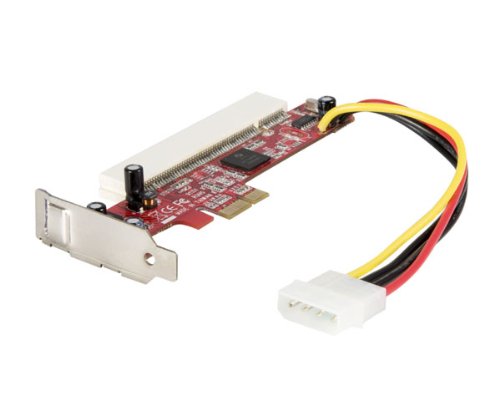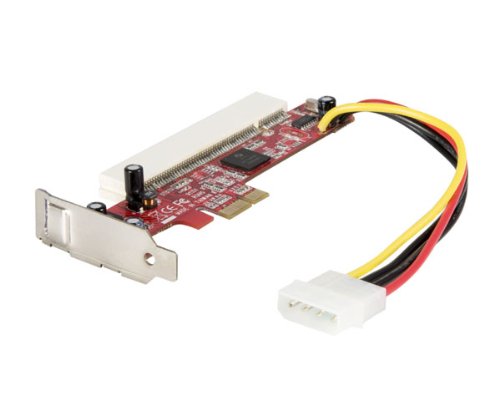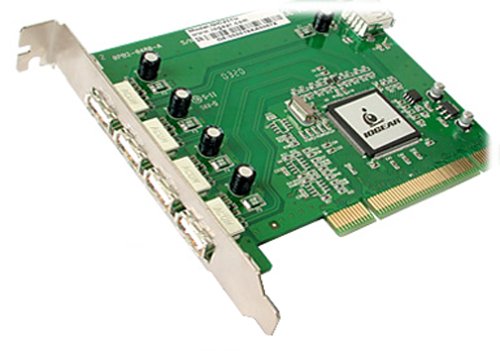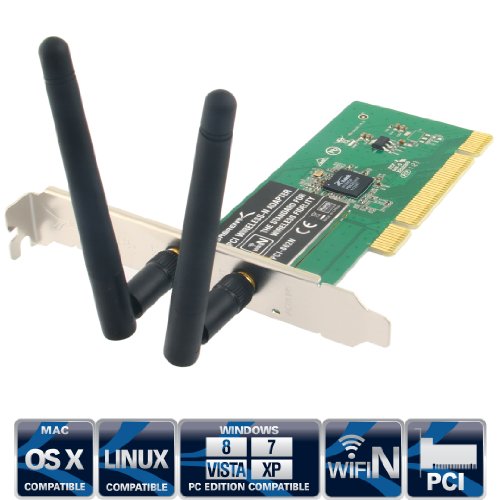
This PCIe to PCI Adapter Card lets you use low profile PCI expansion cards in a server or desktop motherboard PCI Express slot. Compliant with PCI Express Specification 1.0a and PCI Specification 2.2, the adapter card connects through a PCIe 1x slot to provide a low profile PCI slot in its place. A spare full size bracket for PCI Express card is also included for use in larger desktop or server PCI Express slots. A versatile solution, the adapter card converts PCIe to PCI or PCI-X; a built-on LP4 power connector links the card to the computer power supply, allowing you to install universal voltage PCI cards (3.3V/5V).The adapter card offers an economical solution that lets you extend the usability of older or extra PCI Bus cards in newer PCIe capable systems. To ensure suitable installation in any low profile server or desktop computer, the PCIe/PCI adapter features an innovative bracket design that adapts and secures the low profile PCI or PCI-X card into the converted slot.
StarTech.com PCI Express to PCI Adapter Card (PEX1PCI1)




May work for you, depends on your situation.,
I do not write reviews very often. I felt compelled to write one for the PEX1PCI1 in hopes it will help others.
Background:
I purchased the PEX1PCI1 to overcome my motherboard’s limited PCI slot issue. Most motherboard manufacturers are slowly phasing out PCI slots and adding PCIe slots. My ASROck H67M motherboard only has one PCI slot. The PCI slot is populated with my Promise SATA controller card to control 4 of the 5 hard drives in my software Raid-5. I also wanted to use my Audigy 2 ZS sound card. In comes PEX1PCI1 from stage right to possibly fix my problem. The computer I am using the PEX1PCI1 in runs Ubuntu 10.04 64-bit.
Problem:
Based upon another review mentioning the PEX1PCI1 working in Linux, I decide to buy this and give it a go. I did realized the PEX1PCI1 is low profile and did not have a problem with that for what I was doing. I used this in my Ubuntu 10.04 64-bit computer. My problem came about when trying to use the PEX1PCI1 card with the Audigy 2 ZS in it AND the Promise SATA controller card in the PCI slot on the ASROCK H67M. I am not sure what was conflicting, but the sound card was not being recognized. The PEX1PCI1 was being recognized, but not the Audigy 2 ZS that was in it.
Here is the kicker: if I unplugged the 5th hard drive of the Raid-5 array (which was plugged into the H67M’s SATA connector) the sound card would be recognized and work perfectly. Of course this meant I could no longer access my files which I wanted to use. I powered down my pc and reconnected the 5th raid hard drive to the H67M’s SATA connector. I powered the pc on once again, what do you know the raid is seen and the sound card is no longer functioning. For kicks and giggles, I switched the Promise SATA controller card into the PEX1PCI1 and the Audigy 2 ZS into the motherboard’s PCI slot. I powered on my pc and it had no video coming from the video card. My dream of using both the Promise SATA controller card and my sound card came crashing down. Obviously something “wonky” was happening. Yes, “wonky” is a very technical term 😀
Other Thoughts & Findings:
I contacted StarTech’s technical support and told them my situation. StarTech was quick to give me a response of:
“Thank you for your inquiry! We are sorry to hear about your technical difficulty.
It sounds like there may be a conflict between the PEX1PCI1 and something with your PC.
First, if possible attempt to install the PEX1PCI1 into a different Windows based PC to test if the PEX1PCI1 is functional.
If the card functions in the different PC the drivers for devices on the original PC such as video card, bios etc. may need to be updated.
If the card does not function with the original PC please navigate to the link below to begin the exchange process.”
Per their request, I did test the PEX1PCI1 in a Windows pc (Windows 7 64-bit) and it worked as it should of. The Audigy 2 ZS sound card was recognized. Super awesome fun time! Heck it does me no good if it works, but not 100{b81fbfd19e1fca5890798868c0714c408bbd5ec471654b6f9630c0fffa6e7eb3} in the pc I needed it to. Another thing to note is I didn’t have space to put my Promise SATA controller card in the Windows pc. I am not sure if that would of effected the results. The StarTech response was not what I was looking for, but did help me come to a conclusion.
Conclusion:
I will go out on a limb and say if your using the PEX1PCI1 for a Windows pc you “should” have no issues. The PEX1PCI1 in a Linux pc “could” or “may” work for you, but depends if the motherboard chipset will play nice. For example, if the motherboard’s chipset controlling the PCI/PCIe slots will play nice with the PEX1PCI1 and whatever you have populating the PCI/PCIe slots. The cheapest non-creative labs sound card with SPDIF output which is fully supported in Linux is anywhere from $90+ to $180+. I am in the process of RMAing this back to Amazon for a refund. I hope this review is helpful in some way. I wish the StarTech PEX1PCI1 would of worked for me. $35 for the PEX1PCI1 is a paltry sum compared to replacing a $200 sound card. Hopefully it can work for you for your situation.
Was this review helpful to you?

|Works as described,
We are using this adapter to install ISDN adapters in rack servers that only have PCIe slots.
It works ok for what it is intended for, with no additonal drivers or whatsoever (at least under Linux). If you can live with the mechanics and the limitation to Low Profile cards, this device can provide a solution for you.
There are also external boxes where you can connect multiple PCI cards, but these are much more expensive, and have the disadvantage of “another box” and cabling.
So, zero stars to the server vendors who provide no solution to continue to use PCI cards,
and four stars to StarTech for providing a workaround.
Was this review helpful to you?

|May not work in your 64-bit machine!,
This PEX1PCI1 adapter might work perfectly fine in your system, but beware! It may mysteriously disable other peripheral devices in your 64-bit capable system.
This adapter was purchased to adapt an RME PCI host card to a PCIe based system running Windows 7 Pro 64-bit on a H67 Sandybridge mobo with 16GB RAM, and three SATA 3 drives. The RME card is a low-profile card, and fits in the adapter with room to spare with the end plate removed. Great! This saved me having to shell out $500 for a new RME card.
Wait… Where’d my network card go?
The adapter disabled the Realtek Gigabit Ethernet adapter built into the mobo!
After some slot juggling, several reboots, and some scans with PCIScope, I discovered the PEX1PCI1 uses a *32-BIT* Pericom PCI bridge, which is very picky where it lives in a 64-bit environment, and to make the problem worse, it requests a 1M memory window from the BIOS. This means it doesn’t play nice with 64-bit systems, and can disable other devices in the system.
The RME card works fine in my system with I hacked-together PCIe bridge made with a PLX PEX8111 demo board, and it works perfectly, even at 32 samples buffers. Only problem is it’s big and has to sit outside the case.
Back it goes…
Was this review helpful to you?

|